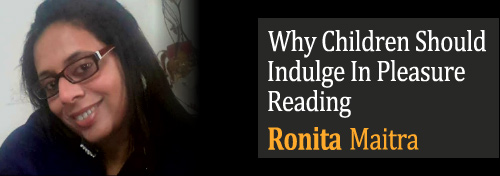Why Children Should Indulge In Pleasure Reading
Reading is to the mind what exercise is to the body – Joseph Addison
My fingers slipped into the little shelf in the small room and there I was again in ‘My World’. A beautiful world stood there, a world of imagination, a world of intelligence, a world of knowledge and undoubtedly a world of pleasure. When I was young I used to hear this very phrase from my Mom quite often “Books are your best friends” and I echo the same words to my daughter.
Reading is an art, reading is a passion, and reading is a way of life. Apart from reading books from that heaped up syllabus, which takes up a lot of time, you should also keep some time aside for ‘Pleasure Reading’ amongst children.
According to a survey, reading habits are diminishing but still it has been confirmed that 32% of kids read for pleasure on a daily basis. Study confirms that reading for pleasure refurbishes children’s brain. Researchers have established the fact that reading for pleasure enhances greater intellectual development and that is not merely confined to a specific arena but an overall improvement in spellings, vocabulary and mathematics are the rewards.
Children in India don’t have much of their time allotted for ‘pleasure reading’. Reading is more or less an affair to cram up a subject for examination. The leftover energy after finishing the syllabus is in no way utilised in ‘Pleasure Reading’, as that time is used for other diversions. The ultimate purpose of reading is to be able to absorb, display your memory in exams and get rewarded in return, that’s it. A few hours of pragmatic study is done during exams, and the quantum of so called ‘knowledge’ gobbled is just some abrupt, incoherent memory of which no evidence is found in the brain once the exams get done. Everything has been poured and splashed onto that answer sheet, marks obtained. Mission accomplished.
But reading for pleasure introduces a child to a new world which leaves an eternal impression. Quoting an example from a book, explaining a concept based on proper knowledge, and debating about an idea with a clear conception is possible if your child is well read and well bred amongst books rather than being merely confined to a half-baked world of learning. It stimulates free thinking, introduces new ideas, and triggers conceptions. A well defined self sufficient approach to learning is imbibed through reading.
How to inculcate reading habits in children?
- Keep a lot of books in the book shelves. Books with alluring images, gripping titles, interesting key words, colours and animated illustrations will attract the attention of young kids and get them curious about reading.
- Use the internet and browse through book sites with your kids, discussing which books they like or dislike.
- Talk about books at home
- Review books together
- Indulge in Book Club activities.
- Award points for reading. These points can be accumulated for rewards.
- Spend some time every week in your nearby library going through books, reading and discussing books, a character, an idea or a subject from a book.
- Ask your kids to choose books instead of you choosing it for them.
- Take a book along in a journey.
- Keep some books in your child’s play area.
- Buy books whenever possible – may be at the station, airport, at the roadside stall, on a shopping spree, from a hawker at the red light or at a bookstore near your house.
“Books are a uniquely portable magic”, said Stephen King. So why deprive your child from weaving that magic?
Do you think pleasure reading is important for kids? How do you ensure that your child reads for pleasure?
Ronita-Maitra Bhandari is a freelance creative writer who writes for various sites and blogs. She has also done a certified course in “Positive Parenting” from U.K. She is a mom to a 7-year-old and loves nurturing her greatest resource, her daughter. Apart from writing she is a nature lover and gets energised wandering around green patches. She believes family is a treasure chest and children are those precious jewels in the chest who sparkle to illuminate lives. What else would one desire to live a rich life?
